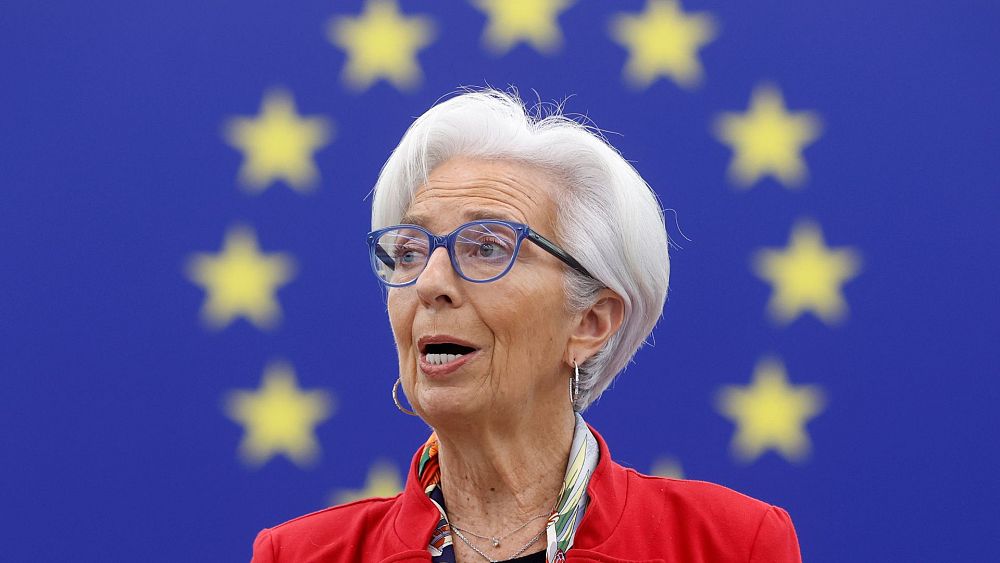The Central Bank of Turkey is expected to continue its policy tightening, but doubts remain as to whether the pace of tightening will be sufficient, given the high inflation rate; meanwhile, the focus in the US is on the jobs market and the unemployment rate's impact on inflation, and pessimism reigns for the euro due to concerns about the ECB's ability to raise interest rates.
The European Central Bank (ECB) faces a complex decision on whether to continue raising interest rates in September as eurozone businesses experience declines in outputs and new orders, with some experts suggesting a pause in rate hikes to ease pressure on the economy.
President of the European Central Bank, Christine Lagarde, stated that interest rates in the European Union will need to remain high to combat inflation, despite progress being made, emphasizing the challenges posed by disruptions in the global and European economies.
Eurozone inflation remains at 5.3%, leading analysts to speculate that the ECB may consider pausing its interest rate hikes in light of a slowing economy.
The ECB expects core inflation to come down throughout the autumn as strong price increases from a year ago fall out of the data; however, energy and food prices are expected to remain bumpy, with inflation standing at 5.3% overall. The ECB emphasizes the need to contain the second-round effects of inflation and to make it clear that the current inflation episode is temporary. Additionally, the central bank does not believe that strategic price controls are the best way to fight inflation. The ECB's modeling approach is focused on assessing what is going on and using models to understand how it will play out, with the understanding that there are limitations to all models. Climate change and demographic transitions have implications for monetary policy, but the net impact on inflation is relatively contained. The ECB has managed to avoid peripheral spreads widening through its policy responses, including the pandemic emergency purchase program and pooled fiscal resourcing. In the future, short-term rates are expected to remain high for a while but come down in the later part of the decade, which helps contain spreads.
The European Commission has revised down its economic forecast, citing high prices for goods and services as a significant factor, leading to reduced growth projections for the European Union and the eurozone. Germany is expected to experience a downturn, while inflation is projected to exceed the European Central Bank's target. Weak consumption, credit provisions, and natural disasters are also contributing to the loss of momentum in the economy. However, the report highlights the strength of the EU labor market with a low unemployment rate.
The European Central Bank is expected to see inflation in the euro zone remain above 3% next year, which strengthens the case for an interest rate increase.
The European Central Bank is facing a dilemma on whether to raise its key interest rate to combat inflation or hold off due to economic deterioration, with investors split on the likelihood of a rate hike.
The European Central Bank is expected to raise interest rates, but traders believe that any immediate risk to the euro is likely to be on the downside, and if there is a hike, it will likely be the last.
The European Central Bank has raised its main interest rate for the 10th consecutive time to tackle inflation, but indicated that further hikes may be paused for now, causing the euro to fall and European stocks to rally.
The European Central Bank's handling of monetary policy under Christine Lagarde, including unnecessary interest rate hikes, risks pushing the Eurozone into a recession.
Germany is projected to be the most heavily impacted by the global economic slowdown due to higher interest rates and weaker global trade, according to the Organisation for Economic Co-operation and Development (OECD), with its economy likely to shrink this year alongside Argentina and experience a weaker 2024. The slowdown in China, inflationary pressures, and tightening monetary policy are among the factors affecting Germany's growth. The OECD also warned of persistent inflation pressures in various economies and called for central banks to maintain restrictive interest rates until underlying inflationary pressures subside.
